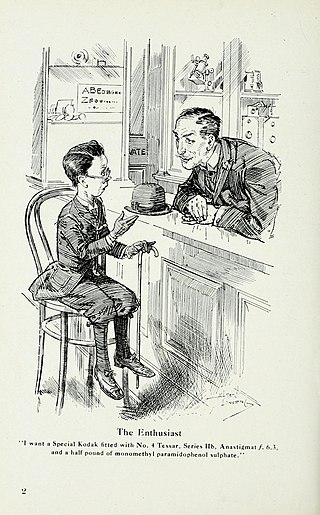An end-user is a person who uses a commercial product or service.
End-user or end user may also refer to:
- User (computing), a person or software using an information system
- Consumer, a person or group using commercial products or services
An end-user is a person who uses a commercial product or service.
End-user or end user may also refer to:

A consumer is a person or a group who intends to order, or use purchased goods, products, or services primarily for personal, social, family, household and similar needs, who is not directly related to entrepreneurial or business activities. The term most commonly refers to a person who purchases goods and services for personal use.
Freeware is software, most often proprietary, that is distributed at no monetary cost to the end user. There is no agreed-upon set of rights, license, or EULA that defines freeware unambiguously; every publisher defines its own rules for the freeware it offers. For instance, modification, redistribution by third parties, and reverse engineering are permitted by some publishers but prohibited by others. Unlike with free and open-source software, which are also often distributed free of charge, the source code for freeware is typically not made available. Freeware may be intended to benefit its producer by, for example, encouraging sales of a more capable version, as in the freemium and shareware business models.
Shareware is a type of proprietary software that is initially shared by the owner for trial use at little or no cost. Often the software has limited functionality or incomplete documentation until the user sends payment to the software developer. Shareware is often offered as a download from a website. Shareware differs from freeware, which is fully-featured software distributed at no cost to the user but without source code being made available; and free and open-source software, in which the source code is freely available for anyone to inspect and alter.

Wholesaling or distributing is the sale of goods or merchandise to retailers; to industrial, commercial, institutional or other professional business users; or to other wholesalers and related subordinated services. In general, it is the sale of goods in bulk to anyone, either a person or an organization, other than the end consumer of that merchandise. Wholesaling is buying goods in bulk quantity, usually directly from the manufacturer or source, at a discounted rate. The retailer then sells the goods to the end consumer at a higher price making a profit.

In product development, an end user is a person who ultimately uses or is intended to ultimately use a product. The end user stands in contrast to users who support or maintain the product, such as sysops, system administrators, database administrators, information technology (IT) experts, software professionals, and computer technicians. End users typically do not possess the technical understanding or skill of the product designers, a fact easily overlooked and forgotten by designers: leading to features creating low customer satisfaction. In information technology, end users are not customers in the usual sense—they are typically employees of the customer. For example, if a large retail corporation buys a software package for its employees to use, even though the large retail corporation was the customer that purchased the software, the end users are the employees of the company, who will use the software at work.
A software company is an organisation — owned either by the state or private — established for profit whose primary products are various forms of software, software technology, distribution, and software product development. They make up the software industry.
Google Toolbar was a web browser toolbar for Internet Explorer, developed by Google. It was first released in 2000 for Internet Explorer 5 and above. Google Toolbar was also distributed as a Mozilla plug-in for Firefox from September 2005 to June 2011. On December 12, 2021, the software was no longer available for download, and the main website now redirects to a support page, though a page still exists with the original page design.
User experience (UX) is how a user interacts with and experiences a product, system or service. It includes a person's perceptions of utility, ease of use, and efficiency. Improving user experience is important to most companies, designers, and creators when creating and refining products because negative user experience can diminish the use of the product and, therefore, any desired positive impacts. Conversely, designing toward profitability as a main objective often conflicts with ethical user experience objectives and even causes harm. User experience is subjective. However, the attributes that make up the user experience are objective.
Use may refer to:
A client access license (CAL) is a commercial software license that allows client computers to use server software services. Most commercial desktop apps are licensed so that payment is required for each installation, but some server products can be licensed so that payment is required for each device or user that accesses the service provided by the software. For example, an instance of Windows Server 2016 for which ten User CALs are purchased allows 10 distinct users to access the server.

User-generated content (UGC), alternatively known as user-created content (UCC), emerged from the rise of intelligent web services which allow everyday users to create of content, such as images, videos, audio, text, testimonials, and software and interact with other users. Online content aggregation platforms such as social media, discussion forums and wikis by their interactive and social nature, no longer produce multimedia content but provide tools to produce, collaborate, and share a variety of content, which can affect the attitudes and behaviors of the audience in various aspects. This transforms the role of consumers from passive spectators to active participants.

In manufacturing and design, a mockup, or mock-up, is a scale or full-size model of a design or device, used for teaching, demonstration, design evaluation, promotion, and other purposes. A mockup may be a prototype if it provides at least part of the functionality of a system and enables testing of a design.
A user is a person who utilizes a computer or network service. A user often has a user account and is identified to the system by a username . Some software products provide services to other systems and have no direct end users.
Proprietary software is software that grants its creator, publisher, or other rightsholder or rightsholder partner a legal monopoly by modern copyright and intellectual property law to exclude the recipient from freely sharing the software or modifying it, and—in some cases, as is the case with some patent-encumbered and EULA-bound software—from making use of the software on their own, thereby restricting their freedoms.

Social media marketing is the use of social media platforms and websites to promote a product or service. Although the terms e-marketing and digital marketing are still dominant in academia, social media marketing is becoming more popular for both practitioners and researchers.

Promotional merchandise are products branded with a logo or slogan and distributed at little or no cost to promote a brand, corporate identity, or event. Such products, which are often informally called promo products, swag, tchotchkes, or freebies, are used in marketing and sales. They are given away or sold at a loss to promote a company, corporate image, brand, or event. They are often distributed as handouts at trade shows, at conferences, on sales calls, and as bonus items in shipped orders. They are often used in guerrilla marketing campaigns.
Discoverability is the degree to which something, especially a piece of content or information, can be found in a search of a file, database, or other information system. Discoverability is a concern in library and information science, many aspects of digital media, software and web development, and in marketing, since products and services cannot be used if people cannot find it or do not understand what it can be used for.
Social spam is unwanted spam content appearing on social networking services, social bookmarking sites, and any website with user-generated content. It can be manifested in many ways, including bulk messages, profanity, insults, hate speech, malicious links, fraudulent reviews, fake friends, and personally identifiable information.

Android Team Awareness Kit (ATAK) is an Android smartphone geospatial infrastructure and military situation awareness app. It allows for precision targeting, surrounding land formation intelligence, situational awareness, navigation, and data sharing. This Android app is a part of the larger TAK family of products. ATAK has a plugin architecture which allows developers to add functionality. This extensible plugin architecture that allows enhanced capabilities for specific mission sets.